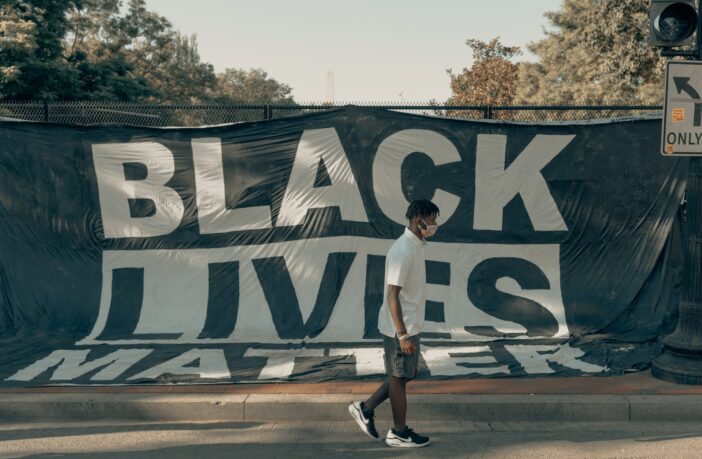Black Lives Matter became an international movement last year. In over 4000 cities people took to the streets to protest, demanding change in the power structures that build upon and benefit from the inequality and oppression of minority communities. How do we keep the momentum to keep changing the world strong now?
Below is part of the discussion that came out from a virtual panel I recently moderated for the UC Trust about how to create true racial equity with:
- Dr. Lorrie Frasure, Ph.D.Associate Professor of Political Science and African American Studies at UCLA.
- Dr. Jamal Myrick, Ed.D. Director of African Student Programs (ASP) at UC Riverside.
- Ms. Olamide Noah, former manager of Creative and Digital Strategy at NAACP legal defense fund and currently studying for an MA in Human Rights Law at SOAS, University of London.
What was it about 2020 that “woke up” the world to the issues facing people of colour? Why was there such a big response?
Ms. Noah said, “during the pandemic, it was impossible to look away from it.” Locked up, unable to go to school, to work, “it was impossible to be a bystander. People rose to that occasion by taking to the streets and not just in America, but in 200 countries across the globe.”
She pointed out the chilling comparison between Covid-19, which attacks the respiratory organs with the murder of George Floyd, who died from suffocation when policeman Derek Chauvin knelt on his neck for 8 minutes and 46 seconds.
“It’s shocking that even in, in the midst of a pandemic, in the midst of a time where the country should be galvanizing together, we still are facing white supremacy as our ultimate enemy.”
For Dr. Myrick, it was also “a tale of two pandemics,” with visible bias and racial disparities in health care treatment. He challenges white people to push the movement forward – in six months to a year from now when the pre-Covid distractions come back and the conversation takes up less news space.
What do you expect – or ask – of Joe Biden and Kamala Harris in terms of tackling racial equity and responding to Black Lives Matter?
Dr. Frasure noted that “racial equity is at the top of the Biden administration’s immediate priorities list.” Importantly, activists “know they have just two years to hold the administration accountable for racial equity issues because the administration knows the power of the ballot and the power of black women and the vote. And so they’re organising in a way that I didn’t see in 2008.”
Ms. Noah added, “probably a result of the last four years, is that organizers, activists, and lobbyists are hitting the ground running to really move forward bills like the George Floyd Justice in Policing Act.”
The George Floyd Justice in Policing Act was introduced in the US House of Representatives on June 08, 2020, aiming to stop police misconduct such as excessive force, no-knock warrants, and racial bias in policing. While the bill passed the Democratic-controlled House of Representatives it did not pass in the Republican-controlled Senate as the previous administration opposed the legislation.
Beyond police & criminal justice reform, there are other areas to tackle – ending the disparity in health care access and education, strengthening accessibility to affordable housing, and homeownership for Black, Brown, and Native families.
Which brings us to defunding the police – what does that mean and what would it look like?
For Dr. Meyrick, one thing is very clear: “American policing has never been and never will be a neutral institution.” What does defunding the police mean? “It is reallocating and redirecting some funds from the police to other organizations that support the community.” In Southern California, Los Angeles has taken $150 million of the Los Angeles Police Department’s $3.5 billion budget and put it towards education, mental health services, job training, small business development, alternatives to incarceration, and supportive counselling services. There are now 13 cities that have been reallocating police budgets, including Minneapolis, San Francisco, New York.
He further underlined that in 9 out of 10 emergency calls, the police are not required and often not the best equipped to respond. “My person is having a mental health breakdown. There’s no need for somebody to come charging into the house with a gun. It is about making sure that folks are getting the opportunity to get the support that they need and they don’t have to fear calling the police. They don’t have to think, ‘do I have my ID. Do I have the information that says that this is my space?’ The Don’t Call The Police model in Austin, Texas could provide inspiration. This online directory was set up in June 2020 and provides a directory of local resources as alternatives to calling the police, with the main aim of avoiding police violence in situations that require de-escalation.
Dr. Frasure pointed out the importance of confronting the academic / activist jargon of “defund the police” which heard at face value – can invoke concern, suspicion, or anger. She is conscious of the responsibility to those outside of the bubble who have the right to be informed about how defunding the police works for them in relation to tax dollars, reallocation of funds, and services provided.
The important takeaway here: defunding the police does not necessarily mean getting rid of law enforcement completely. It means redirecting money from the police department into local municipal budgets, allowing social services to deal with problems faced by the community, such as family disputes or mental health issues.
How do we address white supremacy?
After the events of 6 January 2021, when supporters of Donald Trump invaded the US Capitol, Olamide said, “you can no longer say that divisive rhetoric is just rhetoric. It is inherently violent, and it will produce violence. And we saw that. In order to address that, we need to make sure that white supremacy is labeled as domestic terrorism and those organisations are treated as such.”
One of the models we could follow is the denazification process that Germany embarked upon after WWII, trying to address the fact that this was an ideology that was extremely violent and divisive.
And there needs to be something lost when someone identifies themselves as a white supremacist. “I am encouraged when white supremacists lose their jobs. It shouldn’t be something that is so widely accepted that people can ascend into leadership when donning this badge.”
How do we hold local government accountable?
Dr. Myrick asked us all to make the commitment to ourselves that we won’t let it happen. Keep learning, keep educating yourself. Have someone hold you accountable for your actions. Be registered to vote. Notice where budgets in your town are being allocated. Show up to City Council meetings. Call your representatives.
History suggests that movements don’t take months to cause change. They take years. Protestors marked/marched? for years before the Civil Rights Act in the US was fully implemented.
How can we help business leaders change?
Dr. Frasure quoted Dr. Martin Luther King: “ ‘Everybody can be great…because anybody can serve. You don’t have to have a college degree to serve. You don’t have to make your subject and verb agree to serve. You only need a heart full of grace. A soul generated by love.’ You don’t have to have a fancy degree or title to help us secure the kind of democracy that you want to live in.”
She also said that it is good to reflect and pause, notice the contradictions, before acting. Only 14 days after the insurrection, the first black woman was inaugurated as Vice President. It’s good to take time, to gather your thoughts, to think about how you are going to personally deal with this situation, and publicly respond. Bring others to the table to have thoughtful conversations and acknowledge that you don’t have all the answers.
But, when doing that, be aware of what your black co-workers and colleagues may be going through when they share their ideas around discrimination and bias in the workplace. Know that you may be asking them to share stories and experiences which may be associated with personal trauma and pain. These important conversations can take thoughtfulness, empathy, and time.
Photo by Clay Banks on Unsplash


